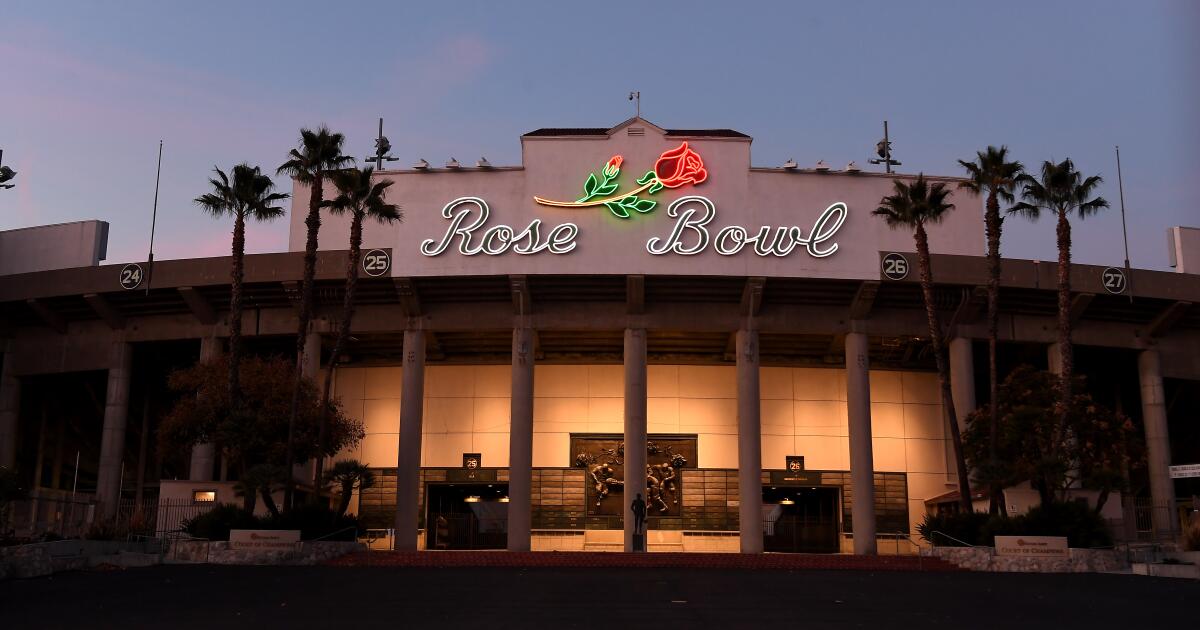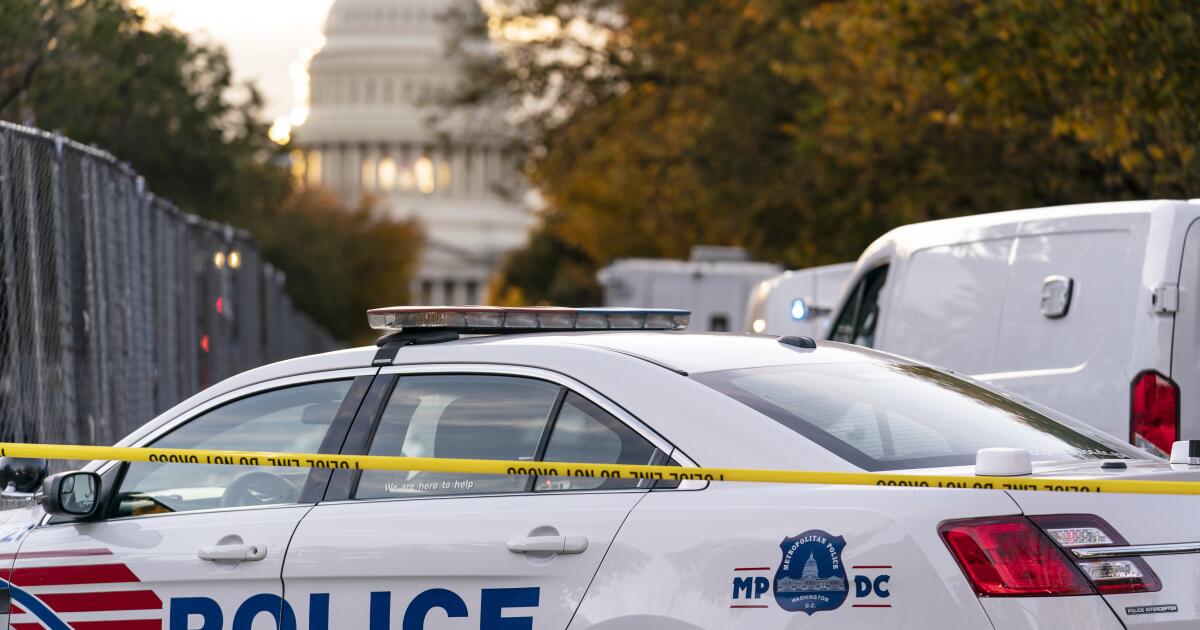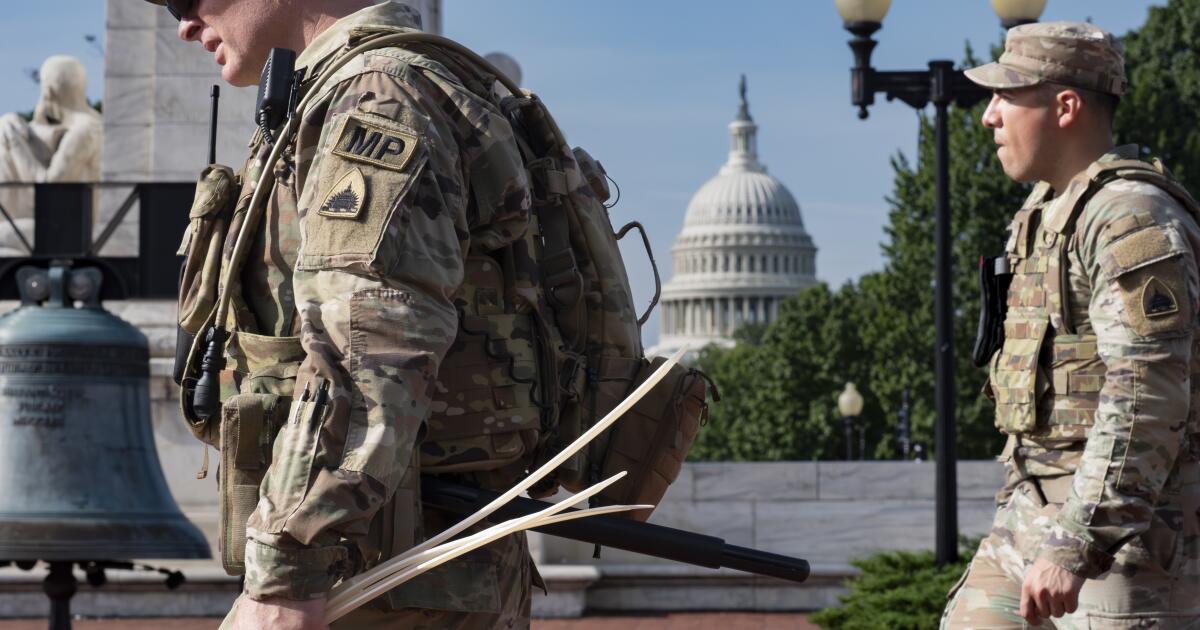WASHINGTON — The Washington, D.C., police chief stepped up cooperation between her officers and federal immigration officials as President Trump’s law enforcement takeover of the nation’s capital took root Thursday. National Guard troops watched over some of the world’s most renowned landmarks, and Humvees took up position in front of the busy main train station.
The police chief’s order establishes that Metropolitan Police Department officers may now share information with immigration agencies regarding people not in custody — such as someone involved in a traffic stop or checkpoint. MPD officers may also provide “transportation for federal immigration employees and detained subject,” the order states.
The changes, which raise collaboration between the two forces in notable ways, erodes the district’s long-standing policy against cooperating with civil immigration enforcement. They are effective immediately.
Mayor Muriel Bowser, walking a tightrope between the Republican White House and the constituency of her largely Democratic city, was out of town Thursday for a family commitment in Martha’s Vineyard but would be back Friday, her office said.
In a city tense from days of ramp-up toward federal law enforcement intervention, volunteers helped homeless people leave long-standing encampments — to where, exactly, was often unclear. Trump told reporters that he was pleased at how the operation — and, now, its direct link with his immigration-control efforts — was unfolding.
“That’s a very positive thing, I have heard that just happened,” Trump said of Police Chief Pamela Smith’s order. “That’s a great step. That’s a great step if they’re doing that.”
A boost in police activity, federal and otherwise
For an already wary Washington, Thursday marked a notable — and highly visible — uptick in presence from the previous two days. The visibility of federal forces around the city, including in many high-traffic areas, was striking to residents going about their lives. Trump has the power to take over federal law enforcement for 30 days before his actions must be reviewed by Congress, though he has said he’ll reevaluate as that deadline approaches.
The response before Thursday had been gradual and, by all appearances, low key. But on Wednesday night, officers set up a checkpoint in one of D.C.’s popular nightlife areas, drawing protests. The White House said 45 arrests were made Wednesday night, with 29 people arrested for living in the country illegally; other arrests included for distribution or possession of drugs, carrying a concealed weapon and assaulting a federal officer.
Troops were stationed outside the Union Station transportation hub as the 800 Guard members who have been activated by Trump start in on missions that include monument security, community safety patrols and beautification efforts, the Pentagon said.
“They will remain until law and order has been restored in the District as determined by the president, standing as the gatekeepers of our great nation’s capital,” Pentagon press secretary Kingsley Wilson said. “The National Guard is uniquely qualified for this mission as a community-based force with strong local ties and disciplined training.”
Wilson said the troops won’t be armed and declined to give more details on what the safety patrols or beautification efforts would entail or how many Guard members have already been sent out on the streets.
National Guard Major Micah Maxwell said troops will assist law enforcement in a variety of roles, including traffic control posts and crowd control. The Guard members have been trained in de-escalation tactics and crowd control equipment, Maxwell said.
The White House said Thursday that Guard members aren’t making arrests but are “protecting federal assets, providing a safe environment for law enforcement officers to make arrests and deterring violent crime with a visible law enforcement presence.”
Although the current deployment is taking place under unprecedented circumstances, National Guard troops are a semi-regular presence in D.C., typically being used during mass public events like the annual Fourth of July celebration. They have regularly been used in the past for crowd control in and around Metro stations.
Trump on Thursday denied that the federal law enforcement officials he sent into Washington’s streets to fight crime have been diverted from priority assignments like counterterrorism. Asked if he was concerned about that, Trump said he’s using a “very small force” of soldiers and that city police are now allowed to do their job properly amidst his security lockdown.
For homeless residents, an uncertain time is at hand
Meanwhile, about a dozen homeless residents in Washington packed up their belongings with help from volunteers from charitable groups and staffers from some city agencies. Items largely were not forcibly thrown out by law enforcement, but a garbage truck idled nearby.
Several protesters held signs close by, some critical of the Trump administration. Once the residents had left, a construction vehicle from a city agency cleared through the remains of the tents.
The departures were voluntary, but they came in response to a clear threat from the Trump administration. Advocates expect law enforcement officers to fan out across D.C. in the coming days to forcibly take down any remaining homeless encampments. In Washington Circle, which still contains a few tents, city workers put up signs announcing “general cleanup of this public space” starting at 10 a.m. Monday.
For two days, small groups of federal officers have been visible in scattered parts of the city. But more were present in high-profile locations Wednesday night, and troops were expected to start doing more missions Thursday.
Agents from Homeland Security Investigations have patrolled the popular U Street corridor, while Drug Enforcement Administration officers were seen on the National Mall, with Guard members parked nearby. DEA agents also joined MPD officers on patrol in the Navy Yard neighborhood, while FBI agents stood along the heavily trafficked Massachusetts Avenue.
Khalil writes for the Associated Press. Associated Press journalists Jacquelyn Martin, Mike Pesoli, Darlene Superville and David Klepper contributed to this report.


